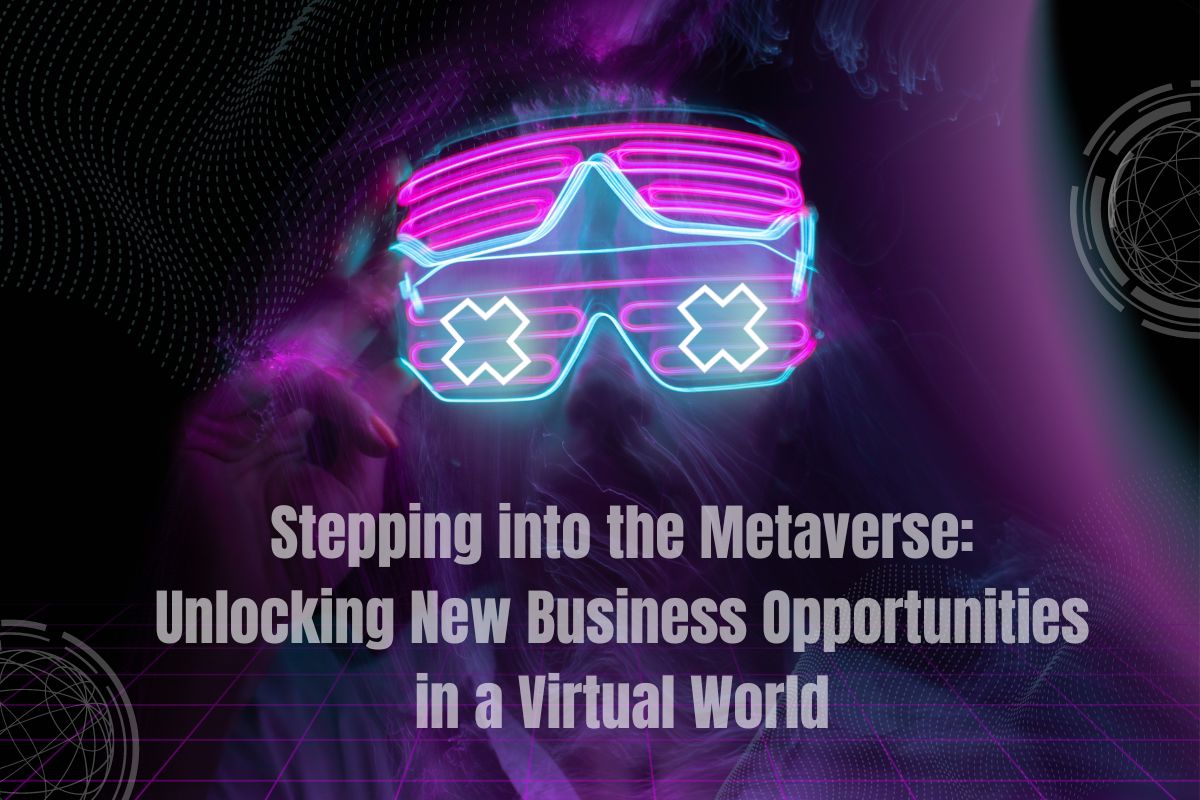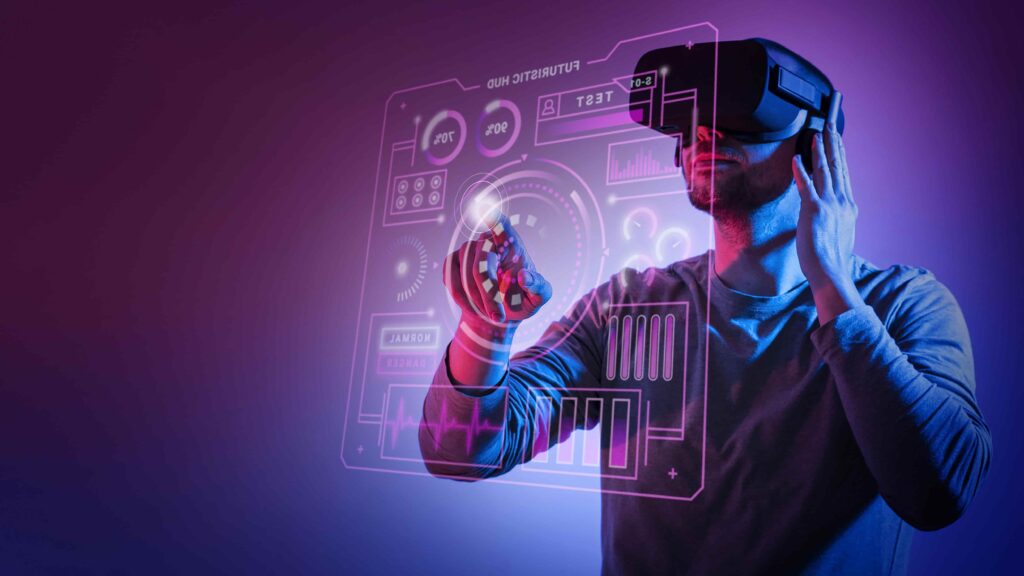Stepping into the Metaverse: Unlocking New Business Opportunities in a Virtual World

Metaverse
If you’re tech-savvy or any other regular person, who is aware of the updates and changes in the tech world, you must have heard about this thing called the Metaverse. It’s like a huge network of virtual worlds where people can hang out, play games, and even buy and sell stuff. But did you know that the it is also a huge opportunity for businesses?
Think about it – the Metaverse offers a level of immersion that traditional advertising and marketing just can’t match. Brands that can create engaging and memorable experiences in the Metaverse will be able to connect with customers in a whole new way.
So in this blog, we’re going to explore some ways businesses can take advantage of the Metaverse. We’ll also look at successful examples of businesses already killing it in the virtual world. But we’ll also talk about some of the challenges and considerations businesses need to be aware of if they want to enter the Metaverse.
Sounds good? Let’s dive in!
Opportunities for businesses in the Metaverse
The Metaverse presents a whole new world of opportunities for businesses. Here are some of the key ways that companies can take advantage of this emerging platform:
- Create immersive experiences
The Metaverse allows businesses to create immersive experiences that are not possible in the real world. For example, a fashion brand could create a virtual runway show where customers can see their latest collection in action. A music label could host a virtual concert that fans can attend from anywhere in the world. The possibilities are endless!
- Connect with customers in new ways
The Metaverse provides a more personal and engaging way for businesses to connect with their customers. Companies can host virtual events, chat with customers in real-time, and even create personalized avatars to represent their brand. This creates a more human connection between the company and its customers, leading to stronger loyalty and increased brand recognition.
- Sell virtual products and services
The Metaverse offers a marketplace for virtual goods and services. This includes everything from virtual clothing and accessories to digital art and music. Companies can create their own virtual products or partner with others to offer a wider range of options. The virtual economy is growing rapidly, with some estimates predicting that it will reach $1 trillion by 2030.
- Monetize content and experiences
Businesses can monetize their content and experiences in the Metaverse in a number of ways. For example, they can charge for access to exclusive areas, offer subscriptions for ongoing content, or accept virtual currency as payment. This provides an additional revenue stream for businesses and can help them to recoup their investment in creating virtual experiences.
While the opportunities in the Metaverse are plentiful, there are also some challenges to consider. In the next section, we’ll explore some of the key considerations for businesses looking to enter this new frontier.
Examples of successful businesses in the Metaverse
As the Metaverse continues to gain momentum, an increasing number of businesses are exploring its potential. Here are some additional examples of successful businesses:
Minecraft
Minecraft is a popular sandbox game that allows players to build and explore virtual worlds. It has become a popular platform for businesses looking to engage with their audiences in the Metaverse. For example, in 2020, the UN launched a Minecraft world where players can learn about the organization’s sustainable development goals.
Meta (formerly Facebook)
Meta, the recently rebranded company formerly known as Facebook, has been investing heavily in the Metaverse. They have stated their intention to build a “Metaverse product that is aligned with our overall mission of bringing people together.” While details are still scarce, Meta has already launched some Metaverse experiences, such as Horizon Workrooms, a virtual meeting platform for remote teams. We’re expecting more advanced products from Meta in the market soon.
Roblox
Roblox is a gaming platform that allows users to create their own games and play games created by others. The platform has over 164 million active users, and many businesses have capitalized on its popularity. For example, Gucci created a virtual world where players can try on and purchase virtual versions of their products. This has allowed the luxury brand to reach a younger audience in a new and engaging way.
Nike
Nike has been experimenting with the Metaverse since 2019, when they released a limited-edition virtual sneaker on the game NBA 2K20. The sneaker could be purchased for real money and worn by players’ virtual avatars. This was a huge success, with the sneakers selling out in just a few minutes. Nike has since expanded its presence in the Metaverse, creating virtual experiences that allow users to interact with their brand in new and exciting ways.
Second Life
Second Life is an online virtual world that has been around since 2003. While it may not have the same hype as newer platforms, it remains a popular destination for businesses looking to engage with audiences in the Metaverse. For example, in 2021, fashion brand Gucci launched a virtual pop-up store in Second Life, allowing users to buy virtual versions of their products.
These are just a few examples of successful businesses in the Metaverse. As more companies begin to explore this emerging platform, we can expect to see even more innovative and creative uses of the Metaverse in the future.
The Future of the Metaverse and its Impact on the Economy

As the Metaverse continues to evolve, its impact on the global economy is likely to grow as well. Here are a few ways that the Metaverse could shape the future of business:
- New revenue streams
The Metaverse presents new opportunities for businesses to generate revenue. Virtual experiences and products can be sold directly to customers, while advertising and brand sponsorships can also be incorporated into the virtual world. As the Metaverse continues to grow, businesses that can establish a presence early on may be well-positioned to benefit from these new revenue streams.
- Remote work and collaboration
The Metaverse could also transform the way that businesses collaborate and work together. Virtual meetings, training sessions, and other forms of remote collaboration could become more immersive and engaging in the Metaverse. This could lead to greater efficiency and productivity, as well as new opportunities for global collaboration.
- Innovation and experimentation
The Metaverse is an entirely new frontier for businesses to explore. As companies experiment with new products and services in this virtual world, they may discover entirely new business models and revenue streams. This experimentation could drive innovation and spur the development of entirely new industries.
- Social and economic inequality
As with any new technology, the Metaverse could also exacerbate existing social and economic inequalities. Access to the Metaverse will likely be limited to those who can afford the necessary equipment and technical expertise. This could lead to the creation of a new digital divide, where those who are excluded from the Metaverse are left behind economically and socially.
- New opportunities for small businesses
While the Metaverse may present challenges for businesses entering this new virtual world, it could also provide new opportunities for small and independent businesses. With lower barriers to entry than traditional brick-and-mortar stores, small businesses may be able to establish a presence in the Metaverse more easily. This could lead to greater competition and innovation, as well as new opportunities for entrepreneurs.
- New forms of entertainment
As the Metaverse becomes more immersive and sophisticated, it could also become a new form of entertainment. In addition to video games and other interactive experiences, it could also become a platform for live performances, concerts, and other forms of entertainment. This could open up new opportunities for artists and performers, as well as new revenue streams for businesses that operate in the entertainment industry.
- New forms of social interaction
The Metaverse could also transform the way that people interact with each other socially. Virtual communities could become more important, and the way that people form relationships and socialize could shift as a result. This could have both positive and negative impacts on the economy, depending on how businesses adapt to these changes.
Conclusion
To sum up, the Metaverse represents a significant opportunity for businesses to tap into a new and rapidly growing market. While there are certainly challenges and uncertainties associated with this emerging virtual world, the potential benefits are too significant to ignore. By staying up-to-date with the latest developments and trends in the Metaverse, businesses can position themselves for success in this new and exciting landscape. Team Xminds have a dedicated team of developers who always have a vision towards the future of Metaverse and new updates happening in this world. Want to talk about the essential updation that you have to bring to your business? Let’s talk!
Related articles



